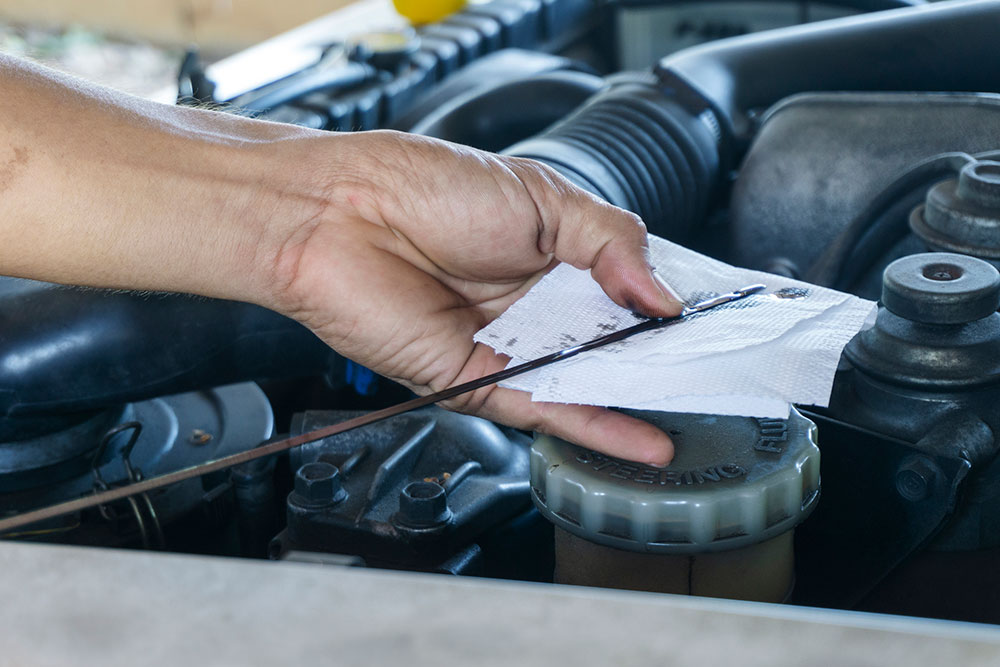Top 10 DIY car maintenance tips

You should spend a few minutes each week to make sure your car is running safely and smoothly.
Here are some basic safety checks that everyone can do:
- Check all exterior lights including your headlights, indicators and brake lights are working.
- Check all glass surfaces are clean and free from chips, cracks and scratches. Windscreens, windows and mirrors should give the driver a clear field of view under the normal range of weather conditions.
- Check the windscreen wipers and washers operate efficiently.
- Check wiper rubbers are secure and in good condition. If they’re not, replacing them is an easy job you can do at home.
- Make sure the horn works.
- Test the handbrake to make sure it holds the car on steep hills. If the handbrake light stays on after the handbrake has been released, check the brake fluid level.
- Check the oil and fluid levels including the battery water level, windscreen washer fluid, engine coolant, power steering fluid and brake and clutch fluid.
- Check the tyre pressure and tyre condition including tread depth. Tread should always be at least 1.5mm across the entire tread width.
- Check your dashboard. Generally, if a warning light comes on when driving or doesn’t switch off when the engine’s running, you should stop when it’s safe, investigate and seek assistance.
- Check the condition of the seat belts for wear and make sure they lock when you give them a tug.
Apart from your own maintenance, it’s important to build a relationship with a good mechanic.
Servicing your car at the recommended times will also keep it running without issues.
Your mechanic should keep you up to date with major repairs coming up, giving you time to budget for the more expensive services.
Use our RACQ Approved Repairer search tool to find a trusted mechanic near you.
Related topics
Things to note
The information in this article has been prepared for general information purposes only and is not intended as legal advice or specific advice to any particular person. Any advice contained in the document is general advice, not intended as legal advice or professional advice and does not take into account any person’s particular circumstances. Before acting on anything based on this advice you should consider its appropriateness to you, having regard to your objectives and needs.
Insurance Products (excluding Travel Insurance) are issued by RACQ Insurance Limited ABN 50 009 704 152 (RACQI) and arranged by its agent, RACQ Distribution Services Pty Ltd (RDS) ABN 35 116 361 650, AFSL 567130 and RDS' authorised representatives (including RACQ Operations Pty Ltd ABN 80 009 663 414, AR No. 234978 (RACQO). Conditions, limits and exclusions apply. RDS and RACQO are in the RACQ group of companies. One of the companies in the RACQ group of companies has a minority shareholding in RACQI.
RDS and RACQO have not taken your personal objectives, circumstances or needs into account when preparing advice regarding insurance products and you will need to consider whether the advice is appropriate for you. Read the Product Disclosure Statement (PDS) and any applicable Supplementary PDS before making a purchase decision on this product. You can also access our Target Market Determinations on this website. RDS receives a commission from RACQI for the policies it arranges. RACQO receives fees paid for services it provides to RDS. Further details about remuneration are available on request prior to purchasing.
Banking and loan products issued by Members Banking Group Limited ABN 83 087 651 054 AFSL/Australian credit licence 241195 trading as RACQ Bank. Terms, conditions, fees, charges and lending policies apply. This is general advice only and may not be right for you. This information does not take your personal objectives, circumstances or needs into account. Read the disclosure documents for your selected product or service, including the Financial Services Guide and the Terms and Conditions, and consider if appropriate for you before deciding.
Except for RACQ Bank, any RACQ entity referred to on this page is not an authorised deposit-taking institution for the purposes of the Banking Act 1959 (Cth). That entity’s obligations do not represent deposits or other liabilities of RACQ Bank. RACQ Bank does not guarantee or otherwise provide assurance in respect of the obligations of that entity, unless noted otherwise.
RACQ Bank subscribes to the Customer Owned Banking Code of Practice which establishes higher standards than the law requires. The Code reflects modern consumer expectations and developments in approaches to issues such as consumer vulnerability, guarantors, and supporting customers through financial hardship. Please read our Customer Owned Banking Code of Practice page for more information.
RACQ Operations Pty Ltd (ABN 80 009 663 414 AR 000234978) and Members Travel Group Pty Ltd (ABN 45 144 538 803 AR 000432492) are acting as an Authorised Representative of the issuer of the insurance, Tokio Marine & Nichido Fire Insurance Co., Ltd. (ABN 80 000 438 291 AFSL 246 548). Any advice set out above is general in nature only, and does not take into account your objectives, financial situation or needs. Before purchasing any travel products, please consider the RACQ Travel Insurance Product Disclosure Statement (PDS) and the Target Market Determinations (TMDs) that apply to these products. Whilst the PDS outlines the Terms and Conditions of these products, the TMDs outline the intended class of customers that comprise the target market for these travel products. This will allow you to consider which products best suit your objectives, financial situation and needs and consider the products appropriateness to your personal circumstances. TMDs also outline matters involving the distribution and the review of these products. The PDS, Supplementary PDS and TMDs for each travel product can be found here.
